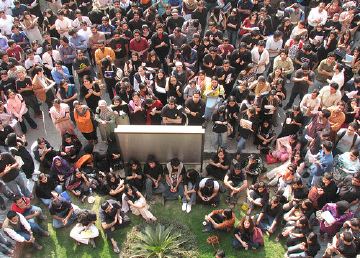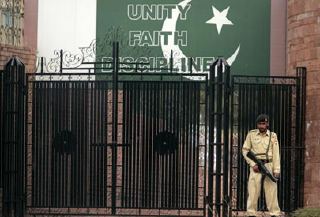Adil Najam
 The frustration and anger that one finds in the comments on the Emergency imposed by Gen. Musharraf in Pakistan is mirrored everywhere. In every conversation one has with any Pakistani anywhere. I was in Pakistan till last weekend and this pent-up feeling of frustration was evident in every conversation even before the Emergency was imposed.
The frustration and anger that one finds in the comments on the Emergency imposed by Gen. Musharraf in Pakistan is mirrored everywhere. In every conversation one has with any Pakistani anywhere. I was in Pakistan till last weekend and this pent-up feeling of frustration was evident in every conversation even before the Emergency was imposed.
It is, of course, a complex feeling emanating from the complex dynamics of our complex politics. At its very core, however, is the burning desire to be able to “do something” about what is happening made all the intense by a sense of helplessness about exactly what it is that we as citizens might, in fact, be able to do that might make a difference.
Since Saturday every conversation I have had with Pakistanis ends in exactly this question. What can we do? I have an in-box full of emails asking me to sign a petition, attend a meeting, say this or that to the media if I speak to them, join a protest, pass on a message, do this or that on ATP, join a conference call to plan a strategy, send out notes to my contacts, and so much more. There have been call after call from friends and acquaintance many of whom not even Pakistanis who just want to talk and share the intensity of their disgust at how the events are unfolding.
Of course, at the basest level doing anything – anything at all – has a cathartic effect and makes one feel that at least we did not do nothing. But the desire to do something is more intense. The desire not to just be a spectator to history. The desire to have contributed something, somehow. As one watches the heroic struggle of the lawyers, and now the students, to stand up and speak out – despite the brutality they are met with – makes this desire even more intense.
We each do what we can. We speak out to the media (I have had more than a dozen media interviews and comments already, we give talks (I have been giving multiple talks on this a day), we send out messages of support to those on the front lines in Pakistan to let them know that they are not alone, we sign petitions, and above all we hold hands in solidarity and vent our feelings where ever we can – on blogs, on phone calls to friends, in gatherings. All of this helps some, but one keeps wondering if it really makes a difference to the big picture?
Even if it is not, it is clearly worth doing. But can more be done? What? How? We would like to hear from our readers on that. Please let us know what is already happening as well as suggest what more could happen.
 Are there to many petitions going around; so many that they might lose their efficacy? Are some of us crossing the line between that which is anti-Musharraf and that which is anti-Pakistan? Even if they mean the same thing, strategically would a message that is pro-constitution, pro-democracy, pro-Pakistani resistance be better than one that is anti-individual? How can one best support those lawyers and students and others who are on the front-line of action, especially those who are not physically there? What, if any, are the dangers of focusing our attention too much of external actors rather than those in Pakistan itself? How does one explain to the media and policy-makers abroad that the events we are seeing is not the failure of a nation (the Pakistani people) these are the failure of a person and a particular government? (I personally have been saying to friends and to the media that I remain bullish on Pakistan and bearish on Musharraf).
Are there to many petitions going around; so many that they might lose their efficacy? Are some of us crossing the line between that which is anti-Musharraf and that which is anti-Pakistan? Even if they mean the same thing, strategically would a message that is pro-constitution, pro-democracy, pro-Pakistani resistance be better than one that is anti-individual? How can one best support those lawyers and students and others who are on the front-line of action, especially those who are not physically there? What, if any, are the dangers of focusing our attention too much of external actors rather than those in Pakistan itself? How does one explain to the media and policy-makers abroad that the events we are seeing is not the failure of a nation (the Pakistani people) these are the failure of a person and a particular government? (I personally have been saying to friends and to the media that I remain bullish on Pakistan and bearish on Musharraf).
These and many others are the questions that boil in ones head. There must be other questions too. Share these with us, but more importantly point us towards answers. Share with our readers what you are doing. How others can help. What should be done.
Note to commentors: My own views on the subject have been pretty clear and I feel no compulsion to either defend them or amend them. While I consider thsi emergency an anti-Pakistan and anti-Pakistani act, I do not doubt the patriotism or integrity of those who disagree. Pakistaniat is based on the premise that there can be, have to be, multiple views and they all must be respected, even when we disagree with them. Those of us who resent the emergency because it has tried to silence certain voices cannot then silence or disempower those who disagree with our views.
I say all this because over the last few days we have had to moderate out too many comments. More, in fact, from people we might agree with than those who we do not. One realizes that the moment is tense and passions are flared, but we stand committed to implementing our comment policy as best as we can. We have moderated, and will continue to do so, not because of content but because of infringements of our comment policy. We are, and will remain, especially careful about inappropriate language, personal attacks, inflammatory and disrespectful tactics, uncivil and slanderous language, and irrelevant diatribes. Please help us in not moderating your comment out by resisting these things. (And, please stop sending us notes about why you can misbehave because someone else did; we try to catch these things as best as we can and even if we miss them sometimes that does not give others a liscence to misbehavior). We remain committed to having a civil discourse and no matter whether we agree with you or not, no matter if you are an old friend or anew acquaintance, we will do our best to maintain that civility. If and when we feel that we are unable to do so, we are more likely to just close down the blog then to give in to people’s tantrums and badtameezi.



















































First of all I would urge people to relax and take a deep breadth. Thank God for all the good things you have going for you. Secondly I would urge you to act responsibly. We need to evolve our society where we can disagree and protest in a civilized manner. So coming to the problem at hand, we have our tiger who has been nurtured to attack our enemies now in a confused and bewildered state doing things it has no business doing, all the while thinking that it is doing those things in order to protect us. So the first order is to try to understand why the tiger is thinking that way and then try to figure out a way to think otherwise or in the end take the fangs away when it comes to internal security.
The tiger thinks that after risking his life the SC lets the terrorists of Lal Masjid go free, SC encourages political leader with criminal records to run for power while being selective in its adjudications, political parties are undemocratic when it comes to internal leader selection, the people are swayed through money and coercions into electing corrupt leaders which results in economic collapse and effect his ability to do his job. Whether it is correct or not, these are the perceptions not only of the tiger but also many other responsible Pakistanis. So historically we have always relied on the teeth of the tiger ( Majors and Colonels of Pakistan Army) to do the right things ( as much as their
brains can muster). This situation will not get fixed till we can assure the tiger that it can go back to doing its job because we the civil society will act responsibly and be civil.
a. We learn to protest in large numbers without resorting to violence, taking law to our hands or blowing ourselves up.
b. The legal branch learns to be even handed and yet active in the enforcement of justice. Swat is a classic case where people have grown disenhanted because the justice was absent.
c. Political parties bring forth leaders that are not completely corrupt.
I am confident that in the end the teeth of the tiger will do the right thing whether people do it or not.
Nasim Zehra in The News
http://thenews.com.pk/daily_detail.asp?id=79232
Big drama,now Benazir comes out with ‘protestors’ jsut to get sympathy vote,knowing very well that the General will ‘sucummb’ to pressure and organise elections with Benazir getting the popular vote;Victory- USA
This is what we can do (thinking a little bit longer term):
When the next government comes to power, hold it (and ourselves) accountable. Demand judicial freedom, demand adherance to the constitution, demand freedom of the press, demand the right to live in peace and security.
If we think now about how to do this long term, we will never end up in this situation again.
A petition already in circulation:
http://www.gopetition.com/petitions/we-oppose-emer gency-in-pakistan.html